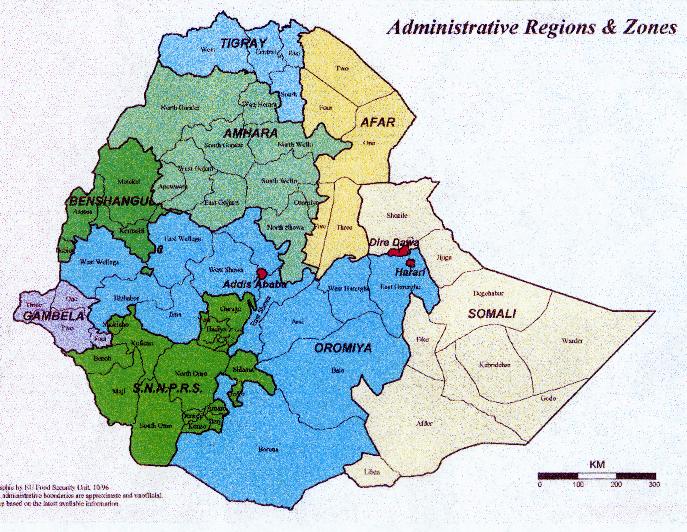By Faisal A. Roble
Editor’s note: This short but poignant opinion was published on the Ethiopian Review by Faisal Roble in February 1992. It was a sequel to an earlier piece “The New Map of Ethiopia” that Faisal has published on the same magazine. The issues raised then, and the debate brewing today in Ethiopia could not have been more relevant.
————–
Self-Determination in Ethiopia: A Must for Somalis

Ethiopia is a country of 51 million people with many ethnic groups, at least ten of which are major national groups. Through successive regimes, an elite group held these disparate ethnic groups together by force. This triggered the formulation of numerous liberation movements which eventually challenged the central government.
After 30 years of fratricidal war, the time has come to craft a democratic system where Ethiopian unity is based on the principles of self-determination.
U.S. President Woodrow Wilson warned the U.S. Congress in 1918 that “self-determination is not a mere phrase. It is an imperative principle of action which statemen will henceforth ignore at their peril.” These words provided nationalists and reformers the sparkles that helped them gain moral and legal grounds against oppressive governments.
By ignoring the rights of the Igbo people, Nigeria had to go through the bitter civil war in late 1960s, which Robert Dahl, professor emeritus at Yale University, called “the greatest scourge in Africa since the slave trade.” Today, Nigeria is a nascent federal system.
In the 1960s Ethiopia symbolized a greater African tragedy, with over two million people dead and five million more displaced due to civil wars in most of the provinces. The calamity started when Haile Selassie unilaterally dissolved the federal status of Eritrea. If nurtured, Eritrea could have serves as a model for the rest of the country. Former dictator Mengistu Haile Marriam rejected representative government and decided to suppress popular demands with help of 12 billion war machine.
The new and fragile partnership between EPRDF and OLF opens a window of opportunity to deal with basic issues. Why do critics of self-determination concept dismiss this opportunity as tribal vendetta? Who has tribal vendetta against whom? Or, is this a disguised way of denying the claims of Oromo, Tigray, Afar, Somalis, Gurage, Adere, and so on?
The question these critics deny most is the Somali question. It is usually portrayed as a border dispute between Somalia and Ethiopia. Western Somali Liberation Front (WSLF) delegation at the July Conference in Addis Ababa, the Western Somali question “is not, never was, a border dispute.” For these critics, the concern of 5 million Somali-Ethiopians is not an issue; holding the land is. At their most cynical moments, both Haile Selassie and Mengistu tries Israeli-style settlement schemes to replace Somalis with settlers. Thanks to the harshness of the environment, it never worked.
As Somali-Ethiopian, self-determination means a lot more to me than a mere secession from Addis Ababa; it is an integrated political principle which promotes the Somali culture, language, and history at no one’s expense. It is also a doctrine of coexistence, like that one which existed in Harar in 1854, when Sir Richard Burton visited the gated town. As he observed, Harar was a city of many peoples (Harari, Somalis, Oromo – all of them “Adere”) where everybody traded and worshiped peacefully. It is only fair to demand that equal status be given to the mosque of Harar as is given to the “young” Orthodox Church.
Also, it is counterproductive to infer from the new map that maximum regional autonomy given to the Somalis is an EPRDF “capitulation to Somali irredentism.” It is not. It is just a new emphasis which, in the hope of coexistence, respects national aspirations.
Contrary to the belief that the fate of Somali Ethiopian is expressed in the constitution of the Democratic Republic of Somalia, it is expressed in the political program of the WSLF which states that “only in a democratic Ethiopia can Western Somalis people exercise their rights to self-determination.” One hopes that extremist views like those expressed by Girma Bakele (see his article: “The Hidden Agenda”) in the January issue of ER will not derail the present opportunity for peace and coexistence.
There are many models Ethiopia can use to solve the ethnic problems. Belgium offers a good experience. A parliamentary government system of 11 political parties has succeeded in promoting coexistence between Flanders (Dutch speakers) and the Wallonia (French speakers). The Los Angeles Times (October 29, 1991) reported: Lived together with their knives drawn for more than a century after Belgium’s founding in 1830, these two groups are slowly and quietly learning to coexist peacefully.” So can the people of Ethiopia.
Faisal A. Roble
Email: [email protected]
———–
Faisal Roble, a writer, political analyst and a former Editor-in-Chief of WardheerNews, is mainly interested in the Horn of Africa region. He is currently the Principal Planner for the City of Los Angeles in charge of Master Planning, Economic Development and Project Implementation Division.
We welcome the submission of all articles for possible publication on WardheerNews.com. WardheerNews will only consider articles sent exclusively. Please email your article today . Opinions expressed in this article are those of the author and do not necessarily reflect the views of WardheerNews.
WardheerNew’s tolerance platform is engaging with diversity of opinion, political ideology and self-expression. Tolerance is a necessary ingredient for creativity and civility.Tolerance fuels tenacity and audacity.
WardheerNews waxay tixgelin gaara siinaysaa maqaaladaha sida gaarka ah loogu soo diro ee aan lagu daabicin goobo kale. Maqaalkani wuxuu ka turjumayaa aragtida Qoraaga loomana fasiran karo tan WardheerNews.
Copyright © 2024 WardheerNews, All rights reserved


